- Home
- Stephen Hunt
Jack Cloudie j-5 Page 3
Jack Cloudie j-5 Read online
Page 3
‘All results of the failure of the undeserving poor to accept their duties as citizens of the Kingdom, results which are evident all around us,’ sounded the judge. ‘In those so feckless that they have wrongly concluded that the poorhouse rather than paid work should be their employer. And for those too worthless to accept even the generous regime of the workhouse, there are always the pockets of their fellow citizens to pick, the windows of good people’s houses to lever open!’ The judge banged his gavel and pointed it angrily towards the gang. ‘The statutes issued by parliament prevent me sending a message to the slums that would be properly understood. Otherwise, have no doubt that, despite your age, I would have all of you standing on the gallows rather than facing transportation to the colonies.’
Jack breathed a sigh of relief. Thank the stars that the liberal-leaning party of the Levellers was still in government in the House of Guardians.
‘But!’ boomed the judge, his hawk-like nose sniffing in disdain, ‘for the ringleader of this foul crime, I thankfully still have available the option of exercising the middle-court’s full discretion.’
Jack glanced over to where Boyd was standing defiantly, his large frame bearing his chains as though they had been tailored for him. Unlucky for Boyd. Well, at least the publicity concerning the trial would mean there would be a couple of well-wishers in the hanging-day crowd who would bribe the executioner’s attendants to jump up and pull on Boyd’s boots if the rope didn’t break his neck clean after he dropped through the trapdoor. Goodbye Boyd, I would say it’s been nice knowing you, but I’m not that good a liar.
The judge lifted up the small square black cap that those condemned to death were forced to wear while waiting in Bonegate jail. ‘Bring the ringleader forward to receive his cap.’
There was a murmur of sympathy from among those watching on the public seats, a few women tossing their handkerchiefs through the line of constables keeping order. Jack stared at them with contempt. This was real life, not a romantic tragedy put on for the mob’s benefit. Jack’s look of contempt turned to astonishment and then to panic as the guards behind him seized his arms and dragged him out beyond the prisoner’s stall. Pushing him in front of the judge. Me? It’s not me, you idiots!
‘Jack Keats,’ said the judge, glaring down, ‘you have corrupted the benefits of your early training at a guild school to foul ends, leading the ill-educated criminal poor of the Sungate slums on a wicked attempt to undermine, nay, to plunder the hard-earned wealth of those who have chosen to prosper through work rather than squandering their gifts.’
‘I didn’t!’ shouted Jack, pointing back at Boyd still on the prisoner’s stand. ‘I wasn’t the leader. It was him.’
‘Your cowardly lies will not save your neck,’ warned the judge, his eyes narrowing. ‘The members of your gang have all named you as the leader of this wicked enterprise.’
Jack stared back shocked at the ranks of the gang he had followed into the basement vaults of Lords Bank. The young criminals who had been incarcerated together with the threatening bulk of Boyd, while Jack had been locked in solitary confinement inside a security cell designed for those who might be able to work mischief on its transaction-engine lock. Boyd was gazing back coolly at Jack, while Maggie and the others couldn’t even meet his startled eyes.
‘Maggie!’ Jack pleaded. ‘Please, tell them-’
‘Silence!’ thundered the judge. ‘It would be clear to a simpleton which among you had the education, knowledge and skills necessary to break into the vault of Lords Bank. The rest of these gutter-scrapings standing before me do not possess such ingenuity. Dear Circle, man, you’re the only one of them that even has his letters.’
‘It is clear. To a simpleton,’ muttered Jack.
He had been betrayed by all of them, even Maggie. Royally rogered. Jack would have been beaten to death if he hadn’t gone along with Boyd on the robbery, but it seemed now as though he was going to meet his maker anyway. Family, you could only ever trust family. Who were his little two brothers in the poorhouse going to rely on when he was gone? The thought gnawed at Jack’s heart as painfully as his sudden death sentence. People like Boyd, that was who they would fall in with on the streets. Repeating my errors and ending up in a courtroom like this in a few years’ time. Failed them, I’ve failed them.
The guards pushed Jack down to his knees, ready to receive the black cap. The whole courtroom appeared to freeze with the unreality of the occasion. What a dramatic scene this would make for the front of the Middlesteel Illustrated News. A lone figure, bent down to receive the swift mark of Jackelian justice, the judge in his dark robes like a figure from mythology on his high perch. The judge who was about to pass down the black cap to a clerk’s outstretched hand when a court reader stood up to discreetly interrupt him. The clerk was whispering in the judge’s ear and pointing to the corner of the public benches where a man was sitting alone. Jack’s eyes widened. He knew the man sitting on the bench. He had seen those piercing eyes before. The ginger hair. But not the clothes, a large military-style cloak that hid almost all of the man’s body. Where have I seen your face before?
‘It appears,’ announced the judge, ‘that in this case the state has elected to exercise its rights under the articles of impressment.’ Reluctantly storing the black cap back under his perch, the judge looked over the contents of the scroll that had exited the clerk’s transparent vacuum message pipe. ‘However,’ the judge fixed the ginger-haired man on the bench with a steely glare. ‘This impressment order merely suggests the service of the Royal Aerostatical Navy as a suitable sentence, rather than expressly dictating it.’
The ginger-haired man stood bolt upright in anger as if he had been well defied, his cloak a second shadow behind him.
Returning his gaze to Jack, the judge glared down at the young thief. ‘There was a time when the RAN used to be a fit service for gentlemen, and you sir, will never be a gentleman. It pains me to see how in this matter, like so many others, times have changed for the worse. It is therefore the express wish of this court that your life impressment is to be served with a punishment battalion of the New Pattern Army. They may be able to flog some of the criminal tendencies out of your hide before you are required to shed your worthless blood in the service of your nation. Now, officers of the court, kindly remove this lowly piece of gutter-scum from our sight.’
Drawn up from their seats, the mob in the court were in a state of near riot at the unexpected turn of events, and Jack was pulled away to the shouts of frantic questions being hurled down at him by newssheet writers, the repeated banging of the judge’s gavel, the yells of sentences of transportation being passed on the remaining members of the gang. Jack was almost overwhelmed by the stench of the jostling crowd, some laughing at him, some spitting and shouting obscenities, others calling out encouragement and trying to press small gifts of waxpaper-wrapped food into his hands. He got a brief glimpse of the dark cloak of the mysterious figure who had brought news of this bizarrely unexpected intervention in the trajectory of his decline, and then he was on his confused way down the cold damp tunnel and back to the holding pens.
It wasn’t the hangman who would be coming to collect Jack now; it was the army and a death almost as certain, if not quite as immediate.
Jack sat with his back against the cold stone wall of the cell. Before he had seen one, he had always expected a cell to be small, cramped and damp. Well, one out of three isn’t bad. All the damp you could wish for. But the cell was closer to one of the poorhouse’s large chambers where make-work was shipped in — sacks to weave, granite slabs to chip into shape; the whole thing built on an industrial scale to house hundreds of the court’s poor and dispossessed ‘patrons’ while they awaited dispatch to their fate. More permanent cells, transportation to the colonies or for an unlucky few, the hangman’s noose. Jack gazed around at the dirty huddled clumps of humanity. The lucky ones still had family or friends outside with enough coins to pay the authorities for a few comforts
for their kin — straw to bed down on and coarse hemp blankets, parcels of food to replace the rancid gruel that was slopped out.
There was a time, a few years ago, when I would have looked down on them, blamed them for their own condition. Now I am them. A time when his father still owned land, collected rents rather than debtors’ bills and gambling losses. The sad truth of the matter was that there wasn’t much that a man wouldn’t do to feed himself. When that person had a family with mouths to feed, there was even less. Jack winced as he tried not to think of his two young brothers sleeping in a place little better than this; different only in name and just as trapped. Poorhouse. Jail. Workhouse. Prison. Interchangeable.
A middle-aged man shuffled over, scratching a long silver beard, wispy and yellowed at the edges from smoking a mumbleweed pipe. ‘You’re the boy who went to guild school?’
‘Brotherhood of Enginemen,’ said Jack. ‘I didn’t sit the exams.’ No, our money had run out long before then.
‘But you’ve got your letters?’ He indicated a couple of families crouched around one of the brick pillars holding up the chamber’s arched roof. They had a newssheet spread open in front of them. Jack nodded. Wearily picking himself up, he walked over to where they were waiting. How his bones creaked and his muscles ached. A day in this rotten hole and already he was moving like he should be drawing a pension. Picking up the paper he looked at the date on the front. ‘It’s two weeks old.’
The man thumped at his chest and hacked out a sawing cough out before croaking. ‘You think the world’s changed much since then?’
‘No.’ Although I had so hoped my world would have. My biggest problem should have been explaining where the sudden shower of gold guineas had appeared from to buy back our estate.
‘Have a look for news of the match workers’ strike,’ said a woman who looked like she might be the mother of one of the families. ‘Are they still bringing in blacklegs to break the strike?’
Jack leafed through the sheaf of large sheets, dark ink staining his fingers, imprinting them from the damp. ‘No mention of the unions here, lady. It’s all talk of a possible war brewing with the Cassarabians.’ They looked up at him, disappointed. There were dozens of families in the cell who had been accused of tearing up cobblestones and throwing them at a factory owner. The recent confrontation between the match workers’ union and the guards who’d been paid to keep the mill open had filled the holding cells.
Jack pointed to the cartoon on the front of the newssheet. A pregnant woman was stretched across a doctor’s table being attended to by a gaggle of surgeons with the faces of famous politicians. A plump young Jackelian boy wearing the uniform of the Royal Aerostatical Navy was jumping up and down in a jealous fit at the sight of a grotesque baby — clearly a Cassarabian — being delivered; the babe also dressed in an opulent airship officer’s uniform. ‘You have a rival, Jack,’ noted the voice balloon hanging over the leering surgeon’s head. ‘Confound you,’ the plump boy was yelling. ‘You promised me nary a sibling.’
‘A bad business,’ said the man.
Jack had to agree. His namesake in the illustration was a Jack Cloudie, an airshipman, and for centuries the monopoly the Kingdom had exercised over the celgas that floated the RAN’s four fleets of airships had kept the nation safe from foreign invasion. Now their belligerent neighbours to the south had secured a supply somehow, and a rival aerial fleet had been spotted patrolling the Jackelian-Cassarabian borders along the uplands. A bad business, indeed. And devilish worse when you’d been sentenced to service in the regiments. First in line when it came to being marched into a fusillade of Cassarabian cannon fire. How much could the world change in two weeks? Always for the worse, that was Jack’s experience. Always for the worse.
The man looked at Jack. ‘What did you get, the boat or the regiments?’
‘The army.’
‘Me too.’ There was a wave of weeping from the woman and her children at that. Of course, it would be transportation to the colonies for them. Without their father. Without her husband. ‘All my life I’ve laboured morning, day and evening. We were just standing on the picket line when management’s men cleared us out with whips and canes. That’s all, just standing there. All my life I’ve done the right thing.’
His voice trailed off.
At least someone here knows what that is.
‘On your feet,’ called the court constable, dragging his cosh along the iron bars of the cell. Jack woke coughing, blinking at the fierce light of the lamp in the policeman’s hand. There were a couple of hulking red-coated soldiers behind the constable, a sergeant and a corporal, the yellow light of the lamp reflected ominously on the death’s heads of their oiled shako hats. The two men fairly strutted along with their left hands balanced on their sheathed sabres to stop them bumping along the damp stone floor. The pair of soldiers might have been Boyd’s older brothers judging by the arrogance of their gait and the unvoiced capacity for violence they left hanging in the air around them.
‘Is this all you have for us?’ said the sergeant, disdainfully.
Jack rubbed the sleep out of his eyes. What were you expecting? A cell full of smartly dressed officers, expert duellists and marksmen for you to press gang into your suicide squad?
‘Not much to look at,’ said the court constable, waving dismissively at the prisoners. ‘But we don’t feed them a fighting man’s rations in here. Give them a plate of gruel and a bayonet and they’ll stick someone for you right enough. Most of them already have.’
‘On your feet, my raggedy boys,’ yelled the sergeant. ‘Move as if you had a purpose — and that was to be chosen by the hand of parliament to serve in its glorious army.’
‘Come on, come on!’ yelled the corporal. ‘Jump to it.’
Jack listened to the creaking of his reluctant bones, a product of the damp, as he joined the others in the cell shuffling through the door that had been opened for them, their leg chains still attached to their ankles. Where were his chains to be removed, Jack wondered? Behind the safe, high stockade of some New Pattern Army barracks, no doubt. Jack felt a sting on the back of his neck as the sergeant encouraged him along with a flick of a swagger stick. ‘Step lively, now. I’ve seen more bleeding life in a fella flogged for sleeping on duty.’
Jack’s wound smarted like a bee sting and he wasn’t the only one to receive some lumps at the hands of the two soldiers sent to collect the convicts. There was an army carriage waiting for them at the other end of the holding cell’s passage, a segmented iron-hulled thing with large spoked wheels. Two soldiers stood in front of it, a man and a female officer, both in brown oiled greatcoats. The appearance of the officer seemed to disconcert the pair of brutes dragging Jack into military service and no wonder. The woman had an angelic face, but frozen with a cold superiority that sat ill at ease with her smooth skin and elegant features; wide eyes that should have radiated softness, glimmered with a piercing intensity instead. She was beautiful the same way an assassin’s dagger was. You might admire it, but only a fool would want to take a closer look.
The male soldier, a broad-shouldered bear of a man with a forked beard salted white with age, came to attention and stamped his boot on the street’s cobbles. ‘The prisoners, lieutenant.’
‘Very good, Oldcastle,’ said the woman.
Both brutes shepherding the convicts into the light halted and saluted back — in what seemed to Jack a rather cursory way — towards the female lieutenant. ‘Prisoners of the Twenty-Second Rifles, sir. The Third Penal Battalion.’
‘Only so long as they don’t escape,’ said the lieutenant.
‘Ah, you’re lucky indeed we caught you two boys in time,’ said the soldier the female officer had named as Oldcastle. He banged the side of the armoured carriage. ‘This old clunker is fine to hold run-of-the-mill ruffians from Bonegate jail, but not this imp!’ His fat fingers jabbed towards Jack. ‘Why, the slippery rascal is the same fellow whose clever fingers nearly teased open the vault of L
ords Bank. The locks on the back of your carriage are like bread and butter to a wicked clever thief like this one.’
‘We have sole custody, sir.’
‘House Guards sent us,’ announced the female lieutenant. ‘The general staff want Jack Keats in a secure stockade cell by the end of the day while they consider what to do with him.’
They do?
‘Of course, lads,’ winked Oldcastle. ‘If you want to keep hold of his sly bones, just write us a little note saying that you wouldn’t discharge him across to us. Two strapping fellows like you to look after the pup, he probably won’t escape, will he? The general staff will understand. Look at the thin rascal; why, I reckon the smoke rising from a good hot beef broth might blow the scrawny, thieving mischief-maker right over.’
The corporal pulled open an armoured door on the carriage for the convicts to board, but the sergeant reached out to stop him. ‘If the boy escapes, we’ll both lose our stripes.’ A key was produced, slipped into Jack’s ankle restraints and the corporal pushed him roughly towards the lieutenant. ‘Your prisoner, sir.’
Jack rubbed the life back into his chaffed shins while the corporal looked knowingly at the old soldier. ‘Keep your eyes on him. Some of these street rats got a turn of speed on them like you wouldn’t expect.’
If you think I can run for it, you’ve never spent a night in those cells.
‘Not a problem, corporal.’ Oldcastle unslung a rifle, a cheap-milled brown bess, the army’s weapon of choice. ‘Why, John Oldcastle could shoot a moustache off this lad’s lips at a thousand yards, were he qualified for growing a man’s set of whiskers.’
The corporal nodded in satisfaction at the answer and the two brutes pushed the rest of their shackled prisoners into the armoured wagon.
Jack was marched around the corner to where a shining civilian horseless carriage was waiting, the hum of high-tension clockwork making the air shiver and spooking a horse pulling a coal cart along on the other side of the road. It was the sort of vehicle Jack imagined a general might be chauffeured around in, but the old soldier John Oldcastle pulled himself into the driving pit in the front of the vehicle’s sloped hull while the woman indicated Jack should climb up into the leather passenger seats mounted in the rear. As the lieutenant mounted the steps, her greatcoat fell open, revealing the white facings on her red uniform. Jack’s eyes narrowed in surprise.

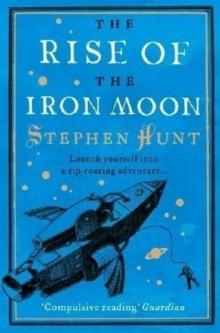 The Rise of the Iron Moon
The Rise of the Iron Moon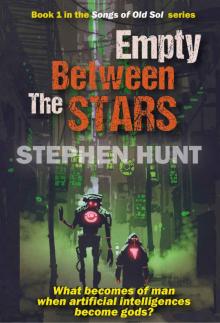 Empty Between the Stars (The Songs of Old Sol Book 1)
Empty Between the Stars (The Songs of Old Sol Book 1)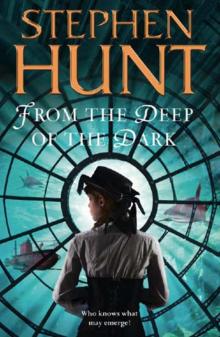 From the Deep of the Dark
From the Deep of the Dark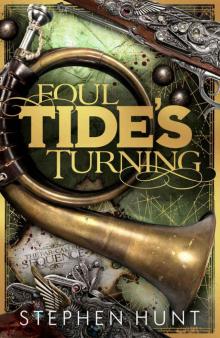 Foul Tide's Turning
Foul Tide's Turning Transference Station
Transference Station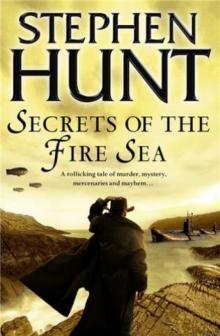 Secrets of the Fire Sea j-4
Secrets of the Fire Sea j-4 Void All The Way Down: The Sliding Void Omnibus
Void All The Way Down: The Sliding Void Omnibus The Kingdom Beyond the Waves j-2
The Kingdom Beyond the Waves j-2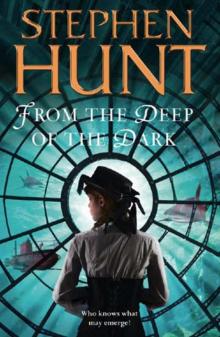 From the Deep of the Dark j-6
From the Deep of the Dark j-6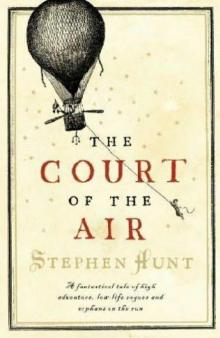 The Court of the Air
The Court of the Air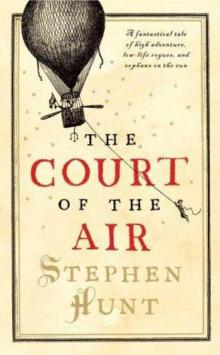 The Court of the Air j-1
The Court of the Air j-1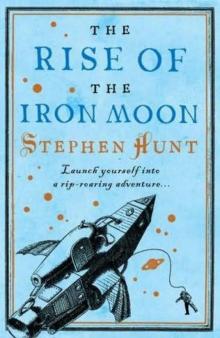 The rise of the Iron Moon j-3
The rise of the Iron Moon j-3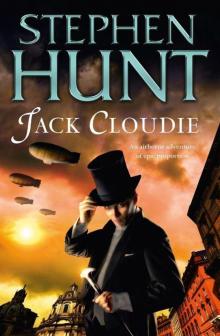 Jack Cloudie j-5
Jack Cloudie j-5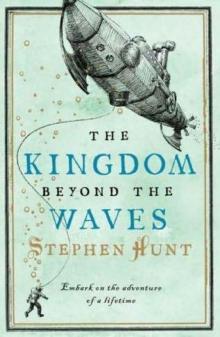 The Kingdom Beyond the Waves
The Kingdom Beyond the Waves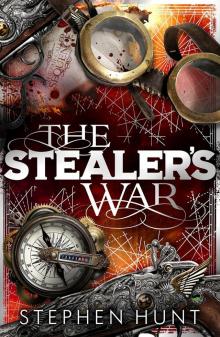 The Stealers' War
The Stealers' War In Dark Service
In Dark Service